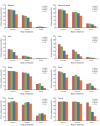Survival of korean adult cancer patients by stage at diagnosis, 2006-2010: national cancer registry study
- PMID: 24155674
- PMCID: PMC3804727
- DOI: 10.4143/crt.2013.45.3.162
Survival of korean adult cancer patients by stage at diagnosis, 2006-2010: national cancer registry study
Abstract
Purpose: Although the cancer stage at diagnosis is the most important prognostic factor for patients' survival, there are few population-based estimates of stage-specific survival outcome, especially in Asian countries. Our study aims to estimate stage-specific survival for Korean patients.
Materials and methods: We analyzed the Korea National Cancer Incidence Database data on 626,506 adult patients aged ≥ 20 years, who were diagnosed between 2006 and 2010 with stomach, colorectal, liver, lung, breast, cervix, prostate, and thyroid cancers. Patients were followed up to December 2011, and the 5-year relative survival rates (RSRs) were calculated for gender and age group by Surveillance, Epidemiology, and End Results (SEER) stage at diagnosis.
Results: The 5-year RSRs for all localized-stage cancers, except for lung and liver, exceeded 90% with that for thyroid cancer being the highest at 100.4%. These values for distant stage liver, lung, and stomach cancers were very dismal at 2.5%, 4.8%, and 5.5%, respectively, while it was 69.1% for thyroid cancer, and was in the range of 18.3-36.4% for colorectal, cervix, breast and prostate cancers. Overall, the 5-year RSRs for all cancer types decreased with aging across all the disease stages with exception of prostate cancer, which suggests biologic difference in these cancer types in a young age group. When compared with US SEER data, Korean patients had better stage-specific survival rates for stomach, colorectal, liver, and cervical cancers.
Conclusion: Korean cancer patients showed relatively favorable stage distribution and 5-year RSRs, which suggests potential contribution of the national cancer screening program.
Keywords: Cancer Registry; Korea; Neoplasms; Stage; Survival.
Conflict of interest statement
Conflict of interest relevant to this article was not reported.
Figures
References
-
- Kwong A, Mang OW, Wong CH, Chau WW, Law SC Hong Kong Breast Cancer Research Group. Breast cancer in Hong Kong, Southern China: the first population-based analysis of epidemiological characteristics, stage-specific, cancer-specific, and disease-free survival in breast cancer patients: 1997-2001. Ann Surg Oncol. 2011;18:3072–3078. - PMC - PubMed
-
- Sankaranarayanan R, Swaminathan R, Brenner H, Chen K, Chia KS, Chen JG, et al. Cancer survival in Africa, Asia, and Central America: a population-based study. Lancet Oncol. 2010;11:165–173. - PubMed
-
- Thornton M. Standards for Cancer Registries, Vol. II. Data standards and data dictionary, record layout version 12.1. 15th ed. Springfield: Notrh American Association of Central Cancer Registries; 2010.
LinkOut - more resources
Full Text Sources
Other Literature Sources


